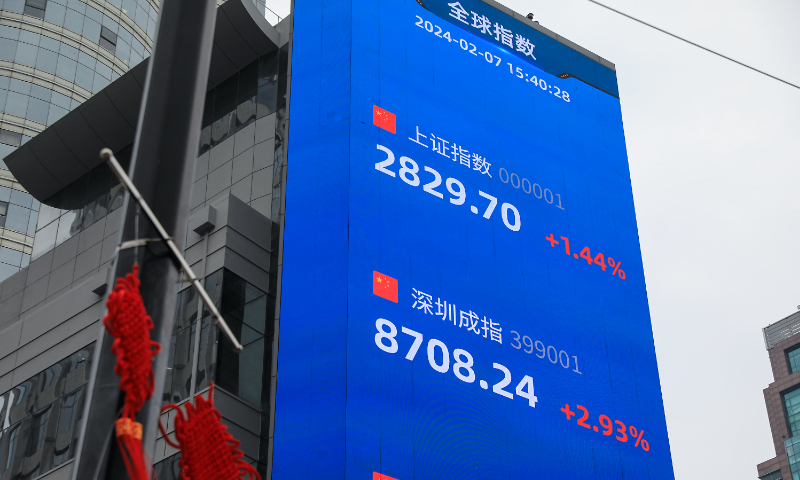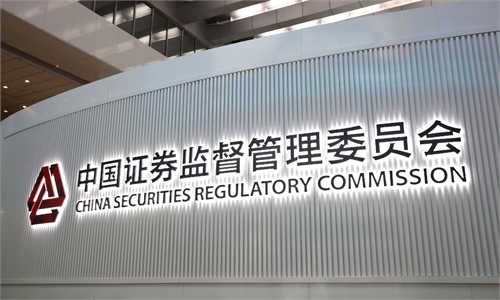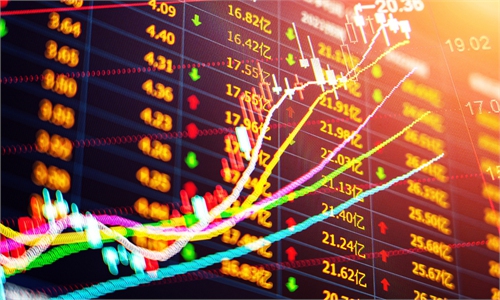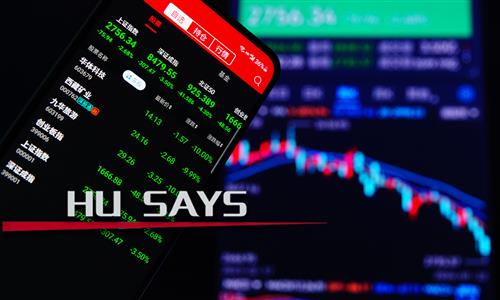Chinese stock market rises for 2nd consecutive day, mirroring investors' recovering confidence in response to sweeping policy boost

An outdoor billboard in Shanghai shows the Shanghai Composite Index rebounding 1.44 percent to 2,829.70 points on February 7, 2024. The Shenzhen Component Index soared 2.93 percent. Combined turnover on the Shanghai and Shenzhen bourses exceeded 1 trillion yuan ($139 billion) for the first time since November 21, 2023. Photo: VCG
Chinese stocks rallied for a second consecutive day on Wednesday, with the benchmark Shanghai Composite Index rising 1.44 percent to close at 2,829.70 points. Combined turnover on the Shanghai and Shenzhen bourses exceeded 1 trillion yuan ($139 billion) for the first time since November 21, 2023.
Observers said that the gains show the recovery of investors' confidence as the market stabilizes, amid the top securities regulator's all-out efforts to shore up equities, including pledges from the "national team" to ramp up investment in A shares, which staged their biggest rally in 14 months on Tuesday.
The concrete policy support, which clearly shows the authorities' resolve to safeguard the stability of the capital market, plus China's promising economic prospects this year, will provide a solid foundation for a steady recovery and long-term positive momentum in the A-share market, analysts said.
The Shenzhen Component Index soared 2.93 percent on Wednesday, while the ChiNext Index, China's Nasdaq-style board consisting largely of technology enterprises, jumped 2.37 percent, rising for the third day in a row.
Gains were led by the shares of rare-earth companies and those involved in rare earths, superconductivity, along with large fund holdings and state-owned enterprises.
On Tuesday, Chinese stocks recorded the biggest gain in years, reversing a six-day losing streak and a downward spiraling in January.
The net inflow of northbound capital, or overseas money flowing into the Chinese mainland's A-share market through Stock Connect programs, reached 1.684 billion yuan on Wednesday, recording net purchases for a seventh consecutive day.
"A rise for two consecutive days will definitely disperse pessimism and offer a huge boost to market confidence. There could be short-term volatility in the following days [before and after the Spring Festival holidays], which is normal in the recovery process, but it is highly likely that gloom and panic selling will pause," Yang Delong, chief economist at Shenzhen-based First Seafront Fund Management Co, told the Global Times on Wednesday.
Analysts pointed out that the A-share market had been mired in a vicious cycle due to a "lack of confidence," under which a capital shortage triggered market slumps and further weakened investors' confidence. At such a time, investors look for clear signals that validate their expectations on the valuation of Chinese equities and bolster market confidence.
According to a report by investment bank China International Capital Corp, as a number of government policies meant to stabilize growth, the market and expectations are either being rolled out or will be soon carried out, this will help defuse short-term liquidity risks and inject dynamism into the market rebound.
The China Securities Regulatory Commission (CSRC) in recent days issued several policy statements aiming to address various aspects of the securities market and crack down on illicit conduct.
The watchdog vowed on Tuesday that it will, in line with the law, suspend securities companies' new business involving share lending for short selling.
On the same day, it held a symposium themed on elevating the investment value of listed companies, as well as one on mergers and acquisitions of listed companies.
The commission reportedly also organized visits starting in late January to key listed companies, as part of measures to step up supervision and improve the valuations of listed companies.
Relevant authorities in Shenzhen, South China's Guangdong Province, reportedly visited three listed firms - logistics service provider SF Express, medical firm Mindray and property developer Vanke - on Tuesday and Wednesday, and they vowed to boost the high-quality development of listed companies to elevate market confidence, maintain the stability of the capital market and the high-quality development of the economy, the Shanghai Securities News reported.
On Tuesday, state-owned Central Huijin Investment, a subsidiary of China's sovereign wealth fund China Investment Corp, announced plans to increase holdings in major exchange-traded funds (ETFs), a move aimed at bolstering the stability and healthy operation of the A-share market.
On Wednesday, high-volume trades were noted in four major ETFs tracking the CSI 300. Their trading volume totaled 38.23 billion yuan, up 25.23 billion yuan from Tuesday.
The CSRC said on Tuesday that it is committed to actively encouraging a broader spectrum of institutional investors to increase their market participation. This includes public and private funds, securities and insurance companies, and pension funds, among others.
The market anticipates more policy support as well as the inflow of more medium- and long-term capital to drive the market into a "virtuous cycle."
Li Changan, a professor at the Academy of China Open Economy Studies of the University of International Business and Economics, told the Global Times on Wednesday that the joining of the "national team" will play a leading and amplifying effect in drawing more capital to stabilize the market.
Li noted that though the stock market is deemed as a barometer of the national economy, recent short-term volatility has deviated from Chinese economic fundamentals.
It is expected the economy's firm recovery trajectory this year would further provide buttress for a stock rebound, analysts said.



